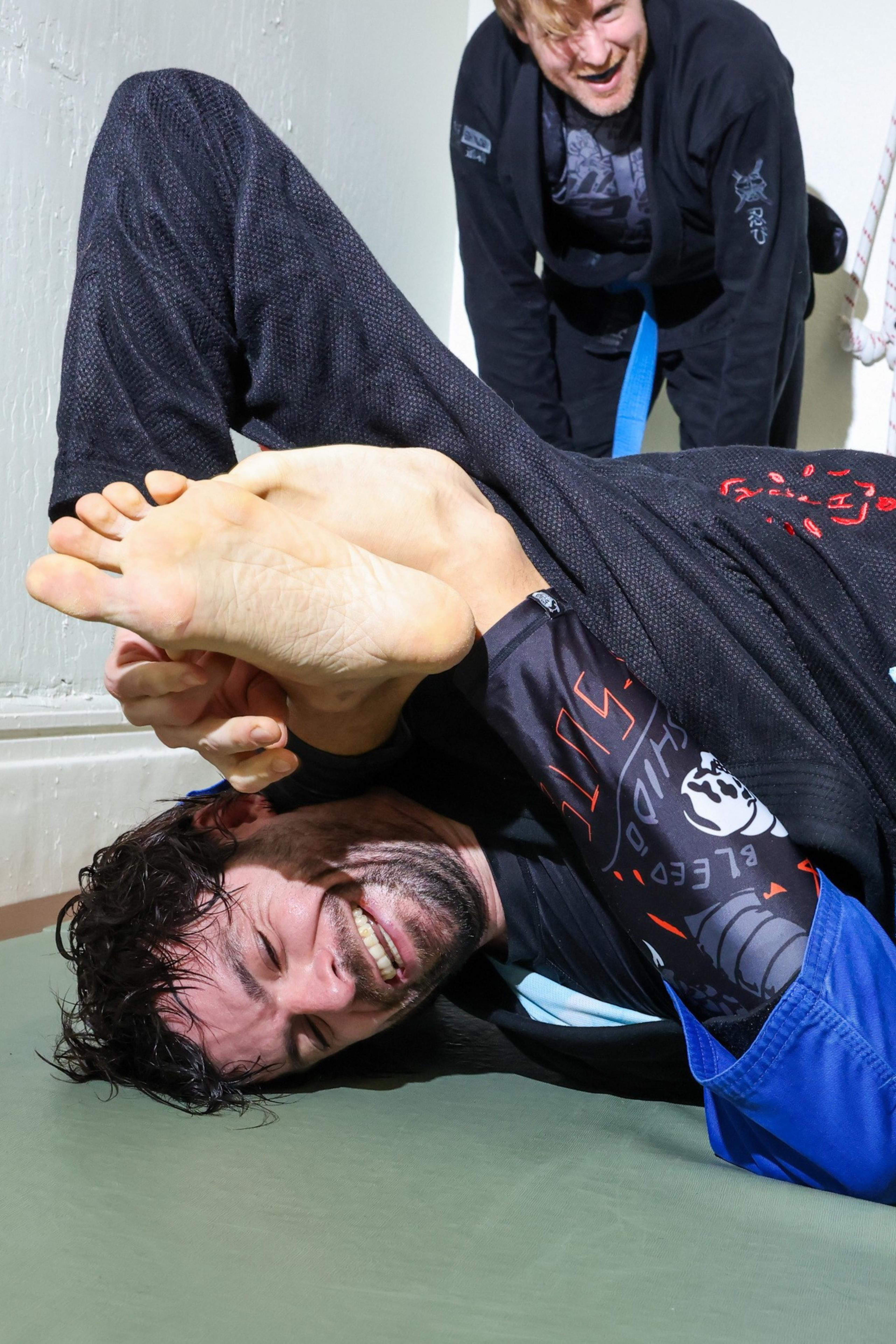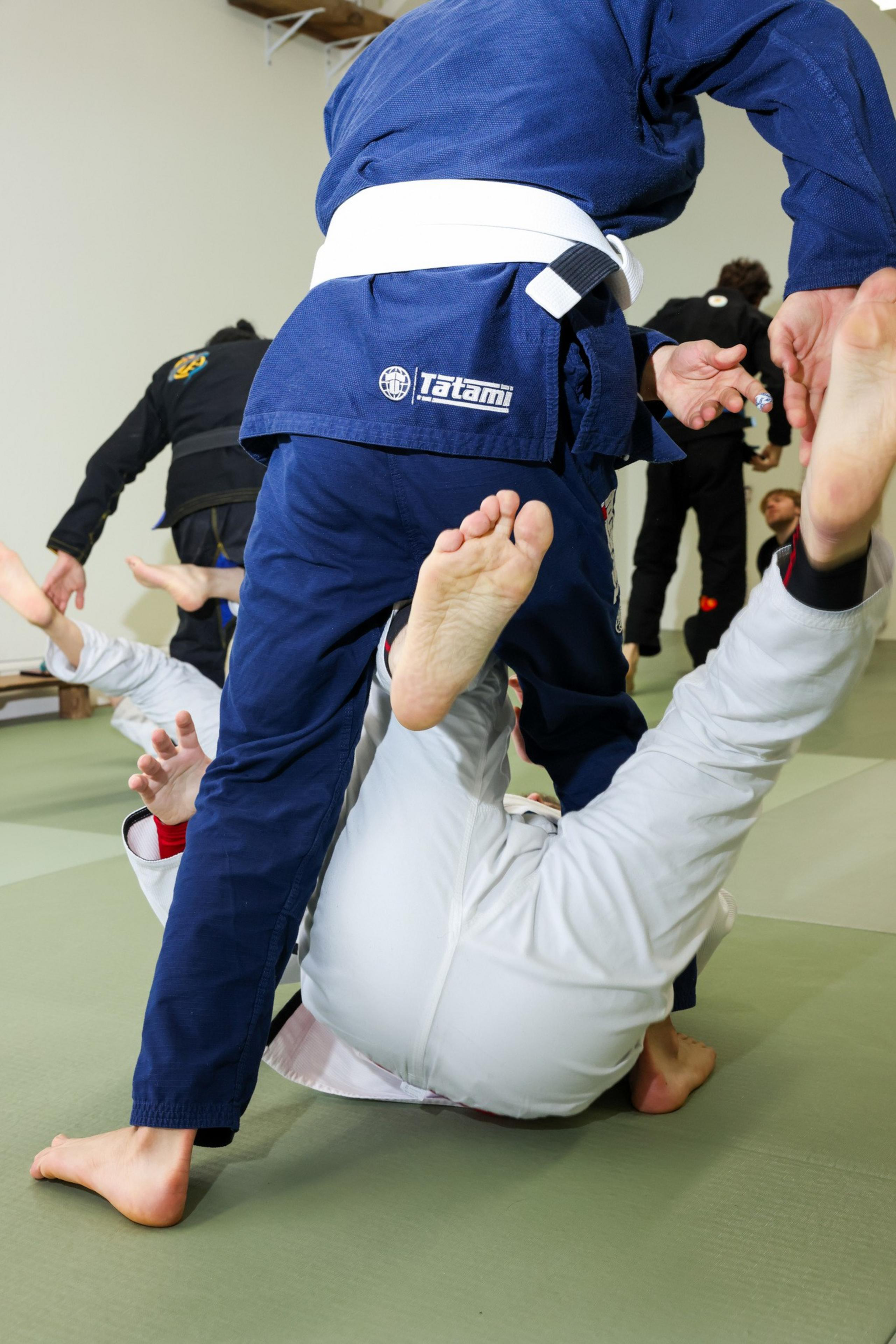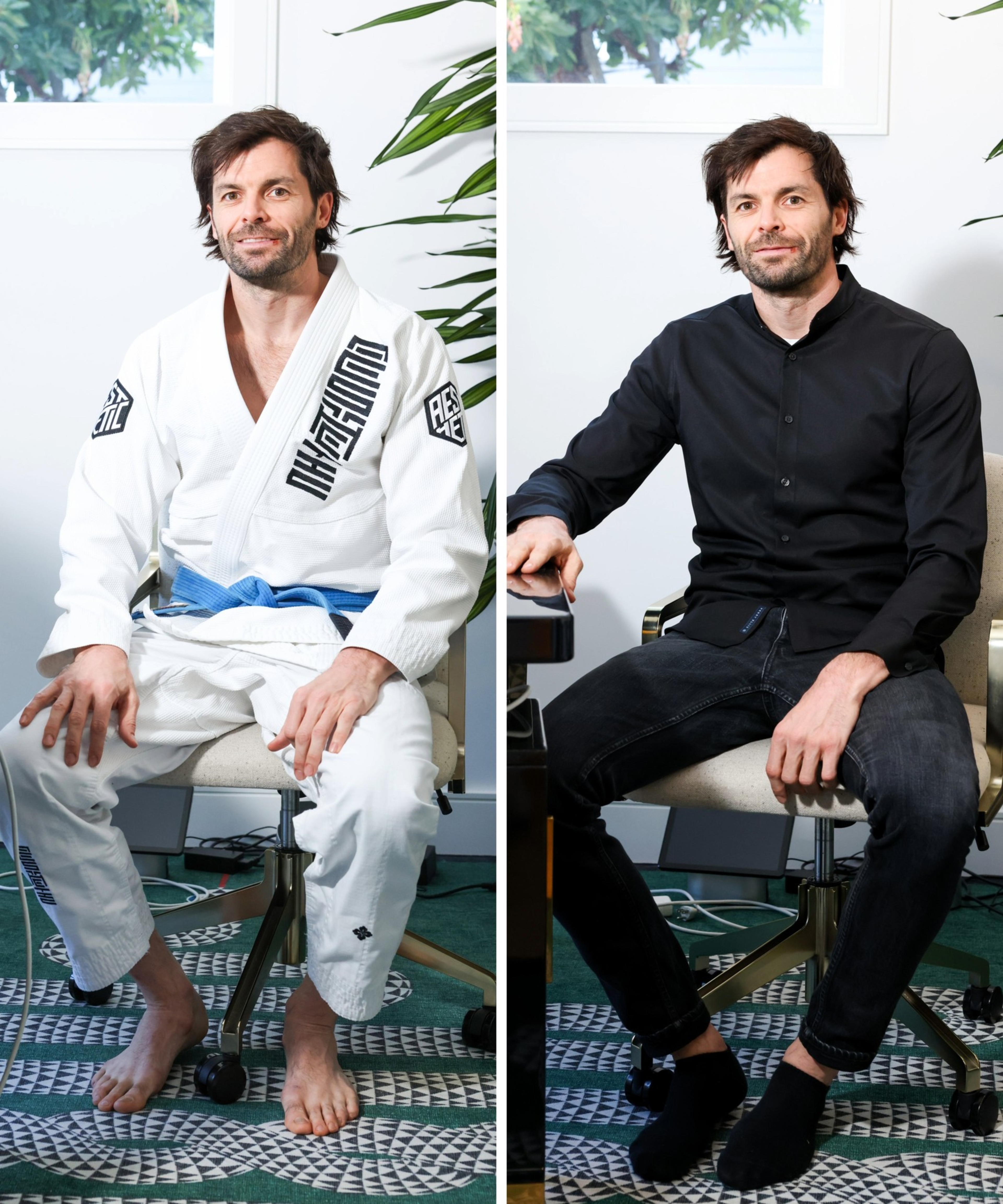Tobi Duschl is on top of me, depriving me of oxygen.
“This is pretty uncomfortable for you,” he says in a strong German accent before releasing his elbow from my throat.
We twist and turn until I’m on top of him, his arms in my grasp. Despite being short of breath, he smiles as he looks into my eyes and instructs me on my next move.
“My job can be very stressful — very high stakes,” Duschl, COO of the software startup Nova, told me ahead of our meeting on the mat. “But jiu-jitsu is way more stressful.”

That’s a good thing, according to Duschl — the former director of global business development for Tesla — and the many other coders, product managers, and tech executives who frequent Maru Dojo (opens in new tab) on 15th and Church streets. While they work for a range of companies with varying levels of responsibility, they all describe the sport’s appeal in similar terms.
“When two people are practicing against each other, you don’t have the mental bandwidth to even, for one iota, think about your work or anything else that’s out there,” said Michael Fernandez, a former enterprise account executive at Workday who recently founded an AI coaching business. “You’re totally focused on primal survival. It becomes a meditation.”

Across the city, tech workers are falling in love with jiu-jitsu — citing not just its physical benefits but its mental and spiritual dimensions. Google (opens in new tab) and LinkedIn (opens in new tab) offer employees free jiu-jitsu classes, and gyms of various sizes are creating close-knit communities of mostly men that are hard to come by these days.
Hugs and coffee outings are common at the end of class, as are sparring partners staying late at the gym to work through specific moves.
“We don’t have that type of proximity and that type of interaction much in our daily lives anymore,” Duschl said. “It’s really cleansing.”
The intimate nature of jiu-jitsu requires training partners to rely on each other in order to get the most out of their practice and makes for significant mentorships.
“A lot of guys don’t really have a strong mentor,” said Ryan McNeil, a software engineer who started training at Maru Dojo a couple of months ago. “That kind of culture is just not really a thing anymore.”
‘It’s like a puzzle’
The Brazilian style of jiu-jitsu was developed a century ago by the storied Gracie family as an adaptation of Japanese judo. It did not gain widespread popularity until members of the family moved to the United States starting in 1972. Rorion Gracie gave it a potent marketing vehicle when he co-founded the Ultimate Fighting Championship in 1993 — and when his brother Royce won its first tournament that year.

Jiu-jitsu got another boost after the Covid pandemic, as evidenced by the sport’s subreddit (opens in new tab), which doubled its membership (opens in new tab) from 327,000 to 689,000 in the year to October 2022.
And nowhere has the sport caught on more forcefully than among software developers.
“Engineers are attracted to jiu-jitsu because it’s like a puzzle that you’re trying to figure out how to solve,” Fernandez said, referring to the infinite number of combinations possible on the mat. “Many engineers growing up weren’t super athletes, and so once they started doing jiu-jitsu, their bodies transformed.”
Without a doubt the most famous example of this phenomenon is Meta CEO Mark Zuckerberg, who has matured from a scrawny college kid to a mogul with an unrivaled watch collection and gym-bulked neck (opens in new tab). Zuckerberg, who, like Duschl, also has a mini gym in his house, discussed (opens in new tab) jiu-jitsu with tech podcaster Lex Fridman on a show (opens in new tab) before the two got into it on the mat themselves (opens in new tab).
“Your ability to keep doing interesting things is your willingness to be embarrassed again and go back to step one and start as a beginner and get your ass kicked and, you know, look stupid doing things,” Zuckerberg told Fridman.
Zuckerberg is not the only prominent jiu-jitsu advocate. Joe Rogan, Russell Brand, and the late Anthony Bourdain achieved high-level belts and have spoken passionately about the blissful challenge of the sport likened to “physical chess.”
While some tout jiu-jitsu as a way to release pent up anger or testosterone, Maru Dojo owner Ray Feliciano says his gym is not a place for “toxic personalities” or “tech bros” looking to impress one another, but rather a place where men — as well as women and children — can be curious, challenge themselves, and grow together.
“When people come here, I have a sit-down,” Feliciano said. “I want to learn their energy. It’s an interview. They don’t know it’s an interview, but it’s an interview.”

Jiu-jitsu differs from karate, tae kwon do, and other martial arts in that the goal is not to strike opponents but to take them to the ground, where they can be forced into submission. This adds to the appeal for amateurs and aging bodies who don’t want to risk injury, although Feliciano is well aware of the potential for harm.
“At the Japanese dojo, when they say the word ‘onegaishimasu,’ it’s basically saying, ‘I’ll take care of your body,’” Feliciano said. “When we’re training, you take care of me; I’ll take care of you. I think in a lot of gyms, sometimes they forget that. It doesn’t get highlighted.”
Feliciano’s students appreciate this ethos.
“I saw how [Feliciano] was teaching 5-year-olds, and I thought, that’s probably good enough to keep me focused and motivated,” Duschl said. “I’m not Mike Tyson trying to win a gold medal here, but rather a dad with a job and a lot of different things on my mind.”
‘You need to be able to pivot’
Many tech workers will gladly speak about the links between their jobs and the martial art — like how escaping a chokehold teaches you to maintain composure on a precarious call.
“When [customers] ask a barrage of very unpleasant questions, you just need to adjust your approach,” Duschl said. “A customer is upset about a delay in a release or an issue that they have with the system that we’re rolling out because that impacts them and their business. You then need to improvise. You need to say, ‘Okay, here’s where we are. I understand that this is a challenging situation.’”
Fernandez notes that the ability to accept the things one cannot change is key to entrepreneurial success.
“If you are a founder, you live in a very unpredictable world,” he said. “You think that things are going perfect one day, and then things are just a disaster the next day. You need to be able to pivot and change and adjust and mold and move forward. Jiu-jitsu as a daily training involves all of those things.”

Meanwhile, getting out of hard situations gives once-sheepish coders like McNeil the willingness to take on challenges at work — and beyond.
“In the past, I was more ‘go with the flow,’ but now I feel like I’m much more assertive,” he said. “You’re doing something physical, but it gives you confidence in all aspects of life. If you can overcome having somebody put you in a headlock, then you can overcome other things too.”
